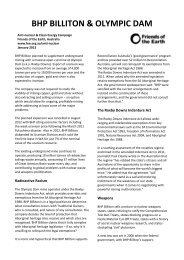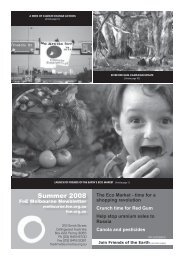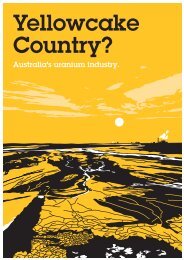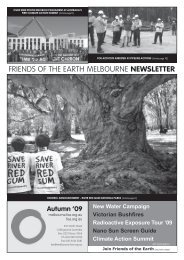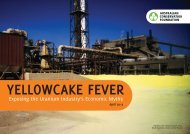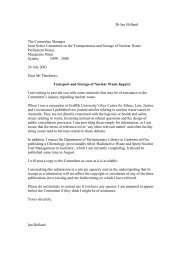Thirty Years of Creative Resistance - Friends of the Earth Australia
Thirty Years of Creative Resistance - Friends of the Earth Australia
Thirty Years of Creative Resistance - Friends of the Earth Australia
Create successful ePaper yourself
Turn your PDF publications into a flip-book with our unique Google optimized e-Paper software.
Whilst FoE <strong>Australia</strong> has worked on <strong>the</strong><br />
issue <strong>of</strong> ‘climate justice’ for four years<br />
now, <strong>the</strong> tour was a strategic and very<br />
public declaration <strong>of</strong> <strong>the</strong> social justice<br />
issues <strong>of</strong> climate change. To date,<br />
science and economic issues, with limited<br />
acknowledgment <strong>of</strong> <strong>the</strong> social and human<br />
rights issues <strong>of</strong> climate change have<br />
dominated climate change debates in<br />
<strong>Australia</strong>.<br />
Nnimmo Bassey, Siuila Toloa and Fiu<br />
Mataese Elisara travelled through<br />
Melbourne, Canberra, Sydney and<br />
Brisbane taking part in twenty meetings<br />
and events.<br />
Nnimmo Bassey was our guest from<br />
Nigeria who spelled out <strong>the</strong> impact <strong>of</strong> oil<br />
transnational corporations activities on<br />
people’s lives and environment <strong>of</strong> <strong>the</strong><br />
Niger Delta. This is <strong>the</strong> point <strong>of</strong> fossil<br />
fuel extraction and in <strong>the</strong> case <strong>of</strong> Nigeria<br />
people <strong>of</strong>ten live without potable water<br />
or reliable electricity – <strong>the</strong>y live in energy<br />
poverty whilst oil accounts for over 90%<br />
<strong>of</strong> <strong>the</strong> countries source <strong>of</strong> income.<br />
Siuila Toloa outlined climate change<br />
impacts and awareness on <strong>the</strong> small<br />
island state <strong>of</strong> Tuvalu – which is actually<br />
a group <strong>of</strong> eight small atolls an average<br />
<strong>of</strong> 2.5 meters above sea-level. The rising<br />
sea has affected crop gardens and fresh<br />
water supplies, as increasingly <strong>the</strong>re is<br />
some inland flooding during high tides<br />
that increases <strong>the</strong> salinity <strong>of</strong> soil and<br />
scarce ground water supplies. This is<br />
accompanied by <strong>the</strong> increasing severity<br />
<strong>of</strong> storms and drought periods, and at<br />
least one unexplainable freak wave, which<br />
damage coastal areas during a calm day<br />
without high winds. One small islet <strong>of</strong><br />
Tuvalu, which was used for fishing and<br />
picnics, has already disappeared beneath<br />
<strong>the</strong> waves during a storm in 1997. So,<br />
rising sea’s is not just <strong>the</strong> record-breaking<br />
flooding that occurred in <strong>the</strong> most recent<br />
spring tide; it is about <strong>the</strong> on-going water<br />
and food independence <strong>of</strong> over 10,000<br />
people who have been living on Tuvalu for<br />
hundreds <strong>of</strong> generations.<br />
...................................................................................................................................................................................................<br />
Climate change is a huge issue <strong>of</strong> inequity<br />
and survival for small island developing<br />
states.<br />
Climate change in <strong>Australia</strong> has become<br />
a choice between coal and <strong>the</strong> survival <strong>of</strong><br />
<strong>the</strong> Pacific.<br />
It should not be an option that we become<br />
climate refugees.<br />
As sovereign states we have a right to<br />
remain in own on lands with our own<br />
language and culture.<br />
Fiu Mataese Elisara (Samoa)<br />
Fiu Mataese Elisara’s message throughout<br />
<strong>the</strong> tour was about spirit, obligation and<br />
equity that he clearly articulated as being<br />
separate from compliance. The expert<br />
advice <strong>of</strong> <strong>the</strong> Intergovernmental Panel <strong>of</strong><br />
Climate Change, which informed <strong>the</strong> initial<br />
design <strong>of</strong> <strong>the</strong> Kyoto Protocol, stated that <strong>the</strong><br />
world needs to achieve 60% cuts on 1990<br />
levels <strong>of</strong> greenhouse gases.<br />
This has been overshadowed by <strong>the</strong><br />
greed for pr<strong>of</strong>it and power by fossil fuel<br />
corporations and large industrial countries<br />
who after seven years are continuing to<br />
argue about 5.5% reduction targets on<br />
greenhouse gases. The world can comply<br />
with <strong>the</strong> Kyoto Protocol and this would be a<br />
good first step, but we should never believe<br />
that this compliance is enough to ensure<br />
intergenerational equity for <strong>the</strong> small island<br />
states <strong>of</strong> <strong>the</strong> Pacific.<br />
FoE 30 <strong>Years</strong> 93



